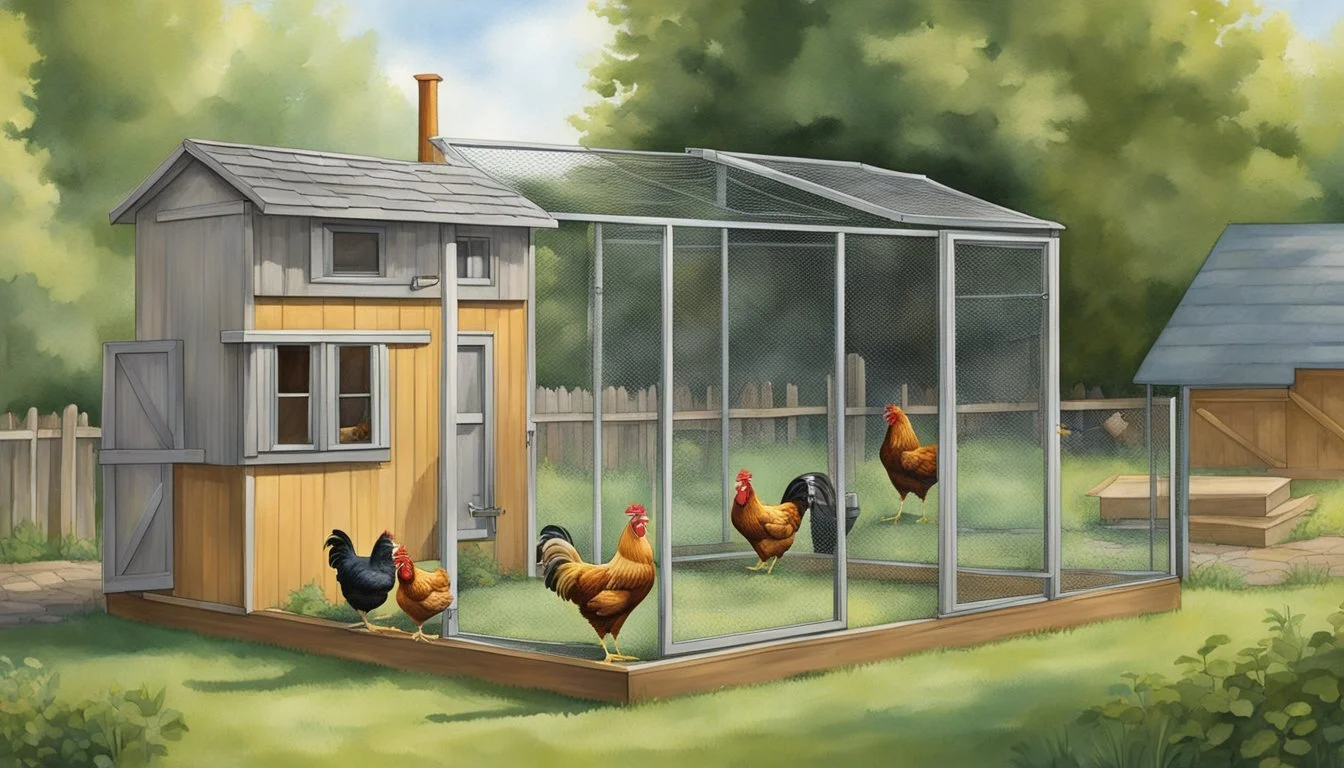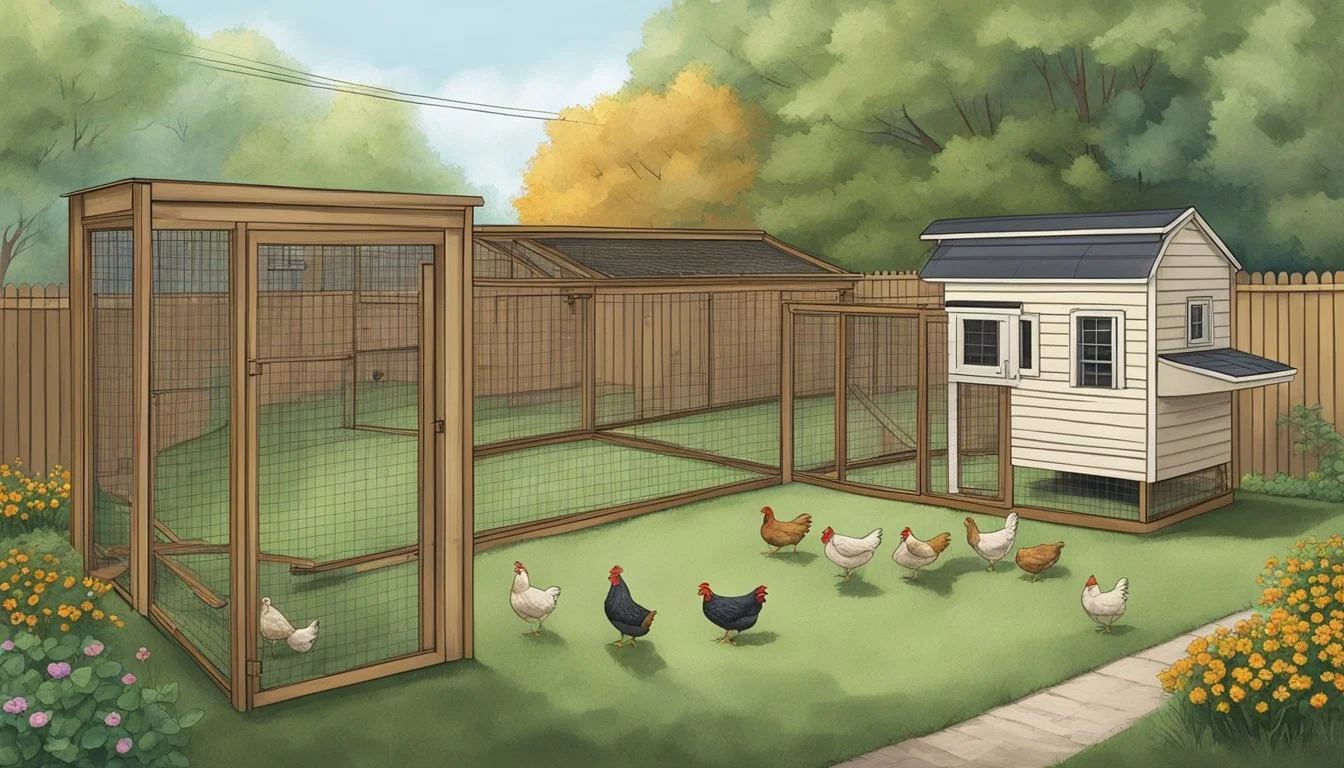Keeping Backyard Chickens in Toledo, OH
Essential Tips for Urban Poultry Farming
Keeping backyard chickens has become an increasingly popular practice for residents in urban and suburban settings, offering the benefits of fresh eggs and a deeper connection to food sources. In Toledo, Ohio, urban farming enthusiasts can enjoy the advantages of raising hens right in their own backyards, courtesy of city regulations that have embraced this sustainable practice. The city ordinance allows for a harmonious balance between urban living and small-scale poultry farming, providing fresh local produce to Toledo families while ensuring the welfare of the animals and maintaining neighborhood peace.
Toledo's specific guidelines for backyard chicken keeping reflect careful consideration of both human and animal residents. Individuals who live in single-family dwellings are permitted to keep up to six hens, providing a sufficient quantity of eggs for most families without creating an excessive burden on the household or the surrounding community. To prevent noise complaints and maintain the urban peace, roosters, known for their loud crowing, are not permitted within the city limits.
Additionally, the city has mandated that all chicken coops be placed at least 25 feet away from any neighboring dwelling's doors or windows. This distances livestock from living spaces, mitigating any concerns about odors or noise affecting nearby residents. The coop placement rule demonstrates the city's commitment to ensuring that the keeping of backyard chickens has a minimal impact on neighbors while allowing residents to pursue a self-sufficient lifestyle. It is notable that citizens who wish to diverge from the stipulated ordinances in Toledo may apply for a special permit, showcasing the city's flexibility and encouragement of urban agriculture.
Understanding Local Ordinances
This section provides an overview of the ordinances and regulations pertinent to keeping backyard chickens in Toledo, OH, along with details on permit requirements and county-specific rules.
Toledo Chicken Ordinance Overview
In Toledo, the local ordinance permits residents to keep a maximum of six hens per single-family dwelling within city limits. Notably, the ownership of roosters is prohibited to prevent noise disturbances. Additionally, it is mandated that chicken coops or enclosures be positioned at least 25 feet away from any residence's doors or windows to prevent any potential nuisances such as noise or odor from affecting neighbors.
Permit Requirements
Residents who intend to keep chickens must ensure they comply with permit regulations. Although the provided search results do not explicitly state the details regarding permits for keeping backyard chickens in Toledo, citizens are typically required to apply for a permit through the local city or county government offices. Permitting ensures that residents are in line with the specific requirements and standards set by the city for the upkeep and management of backyard chickens.
Lucas County Regulations
While the provided information predominantly focuses on Toledo, regulations can vary within Lucas County. Anyone residing outside Toledo city limits but within Lucas County should verify county-specific laws as they may differ from Toledo's ordinances. Regulations at the county level often address factors like property size, the number of animals per acre, and public health guidelines that ensure the welfare of both the chickens and the community.
Preparing Your Property
When considering raising backyard chickens in Toledo, OH, residents must prioritize selecting a suitable location on their property and adhering to specific coop requirements to ensure a safe and healthy environment for the chickens.
Identifying Appropriate Space
The first step in preparing your property for backyard chickens is to identify an appropriate space that complies with local ordinances. In Toledo, residents are allowed to keep backyard chickens in residential areas under certain conditions:
Lot Line Setbacks: Coops or cages housing chickens must be placed at least 25 feet away from any door or window of any dwelling other than the owner's.
Front Yard Restrictions: Keeping chickens in the front yard is not permitted.
Property Size: Adequate space must be available to avoid overcrowding and maintain sanitary conditions.
Fencing: An adequately fenced outdoor enclosure is required to protect chickens from predators and to prevent them from escaping.
Coop Specifications
The chicken coop itself must meet several specifications to comply with Toledo's regulations and to ensure the welfare of the chickens:
Predator-Proof: The coop should be solid and secure to protect chickens from predators.
Well-Ventilated: Proper ventilation is essential to keep the air fresh and to maintain a healthy environment inside the coop.
Sanitary Conditions: The coop and enclosure must be kept clean to prevent the spread of disease and to avoid attracting pests.
Size: There must be enough interior space to comfortably house up to six hens, as allowed per single-family dwelling in Toledo.
By thoroughly evaluating your property and designing the chicken coop to meet these requirements, residents of Toledo can create a conducive environment for keeping backyard chickens.
Maintaining a Healthy Flock
Ensuring sanitary conditions and addressing potential complaints are crucial for keeping a healthy flock of chickens in Toledo, OH. Residents must comply with specific regulations to maintain flock health and community harmony.
Sanitation and Hygiene
Maintaining a clean environment is essential for the health of backyard chickens. Coops should be regularly cleaned to prevent the buildup of waste and to deter pests. It's important to remove droppings frequently and provide fresh bedding. Proper ventilation is also crucial to reduce moisture and ammonia levels, which can contribute to respiratory issues in hens.
Daily: Remove droppings and check for any signs of pests.
Weekly: Replace bedding and clean feeders and waterers.
Monthly: Conduct a thorough clean of the entire coop and run.
These practices ensure the sanitary conditions necessary to prevent disease and keep the flock healthy.
Dealing with Offensive Odors
Odors can be a nuisance to neighbors and a sign of poor hygiene in the coop. To manage odors:
Ensure adequate ventilation in the chicken coop.
Use proper bedding materials, such as straw or wood shavings, that absorb moisture and smells.
Implement a composting system for chicken waste to minimize offensive odors.
These steps will help maintain a pleasant environment and reduce complaints from neighbors.
Managing Noise and Complaints
To avoid disturbing the community, residents should address noise and manage complaints proactively.
Noise: Hens typically produce less noise than roosters, which are prohibited within Toledo city limits. Nevertheless, owners should monitor noise levels, especially in the early morning.
Complaints: Should there be concerns from neighbors, it is advisable to engage in a calm dialogue to address issues. The health department can provide resources on how to keep chickens without causing disturbances.
Coop location should be considered as well; coops must be placed at least 25 feet away from neighboring dwellings to minimize direct impact.
In Toledo, OH, keeping the backyard flock healthy and neighbors happy requires attention to sanitation, odor management, and community engagement.
Legal Considerations
When keeping backyard chickens in Toledo, Ohio, it is imperative to understand and adhere to the local ordinances. Compliance with these legal requirements will ensure that residents can maintain their chicken coops without facing penalties or legal disputes.
Slaughtering Restrictions
It is important to note that the slaughtering of chickens within Toledo city limits is subject to strict regulation. Residents must consult the Toledo-Lucas County Health Department's guidelines to ensure that any slaughtering activity is performed within legal parameters. Any deviation from the allowed practices can lead to sanctions.
Handling Legal Disputes
Should a legal dispute arise due to complaints—from neighbors, for instance—individuals are expected to address these concerns through prescribed channels. Toledo's municipal code provides a framework for handling such disputes. Residents may need to seek a variance in certain situations, which is a legal process to formally request an exception to the ordinance. The following table presents a brief summary of the process:
Step Description Initial Complaint Received Complaints are filed and reviewed by local authorities. Assessment of Violation Officials determine if there is a breach of the chicken-keeping regulations. Notice and Opportunity to Cure The chicken keeper is notified and may be given a chance to rectify the violation. Seeking a Variance If a permanent solution requires deviation from the rules, a variance application may be necessary. Legal Resolution Compliance or appropriate adjustments must be made to resolve the issue, potentially involving legal action.
Understanding these procedures will be beneficial for Toledo residents in maintaining harmony within the community and upholding the legal standards pertaining to backyard chickens.
Chicken Care and Management
Proper care and management are crucial for the health and productivity of backyard chickens. In Toledo, OH, residents are permitted to keep a small flock, and there are specific measures necessary for their well-being—especially in feeding, protection, and egg handling.
Feeding and Nutrition
Chickens require a balanced diet to maintain their health and egg production. A typical diet should consist of:
Layers pellets: Formulated for egg-laying hens, providing essential nutrients.
Grit: Helps with digestion, as chickens lack teeth.
Fresh water: Must be available at all times.
Chickens can also enjoy kitchen scraps in moderation, but owners should avoid anything moldy, salty, or toxic to birds. A feeder should be used to keep food clean and dry, and feed should be stored in a secure location to avoid attracting pests.
Protection from Predators
A predator-proof coop is essential to safeguard chickens from common threats such as foxes, raccoons, and birds of prey. A secure coop includes:
Sturdy construction: No gaps or weak spots.
Lockable doors: Secured against clever predators.
Wire mesh: Fine enough to prevent entry.
Coops need to be regularly inspected for potential breaches. In addition, a fenced outdoor run allows for safe exercise, and should also be constructed with protection in mind, including an overhead cover to prevent attacks from flying predators.
Egg Collection and Utilization
Regular egg collection is important to ensure freshness and deter predators or brooding hens. Consider the following:
Nesting boxes: Should be clean, comfortable, and darkened for privacy.
Daily collection: Preferably in the morning, to reduce the chances of the eggs being soiled or eaten.
Egg storage: At room temperature for immediate use, or refrigerated if not used within a day.
The number of eggs produced can vary with factors like hen age, breed, and diet. Eggs from backyard flocks are often used for household consumption or as a source of local, sustainable food for community sharing.
Additional Resources
When considering raising backyard chickens in Toledo, OH, residents have access to a range of resources. These resources can offer valuable insights into local ordinances, best practices, and community support to ensure the success and legality of their poultry ventures.
Learning from Other Cities
Toledoans can benefit from understanding how other Ohio cities manage backyard chickens. Cities such as Columbus, Cleveland, Cincinnati, Akron, and Elyria have their unique sets of ordinances and support systems. Columbus, for instance, is proactive in providing guidance for proper shelter and care for backyard poultry. By assessing the regulations and educational materials from these cities, individuals can gather diverse perspectives and responsible practices to apply in their own backyards.
City Notable Ordinance Columbus Guidance for proper shelter and care Cleveland Regulations for hen-keeping Cincinnati Rules on the number of hens and coop requirements Akron Permitting process and coop standards Elyria Specific permit information and hen limitations
Community Programs and Support
In Toledo, community programs and support structures are instrumental for aspiring and current backyard chicken owners. They can provide opportunities for newcomers to learn about poultry care and connect with seasoned chicken enthusiasts for advice and support. Local city agricultural extensions, farming cooperatives, and online forums dedicated to Toledo, OH, are great starting points for individuals seeking additional information and guidance on backyard chicken keeping. These entities offer an array of resources, from legal advice pertaining to local ordinances to practical tips on keeping chickens healthy and safe.








